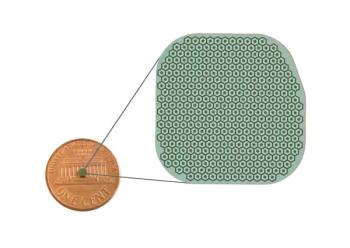
- Optometry Times September 2019
- Volume 11
- Issue 9
Q&A: Optometric physician at McDonald Eye Associates in North West Arkansas
Meet Jade Coats, OD.
Where did you grow up?
I am born and raised in Hot Springs, AR. My mom is a pharmaceutical sales rep, and my dad is the owner of Grapette Soda. He works closely with Walmart creating the flavors for soda and ice cream. He thought that one of his five children would be able to take that over but so far I’m an optometrist, my brother is an MD, my sister is going to optometry school, next one is an engineer, and the next one is a lawyer.
Why switch from pharmacy to opticianry?
Deep down, I always knew I wanted to be an optometrist-I did a project on optometrists in the fifth grade. I was blessed to have an influential and impactful OD who didn’t treat me like the kid that I was but involved me in eye care. It sparked this interest. Given that my mom was in pharma sales, in college I quickly realized it was a great side job and I could get paid more than average for the same amount of time. So, I decided to work as a pharmacy tech, which was great, but it helped me solidify that I really wanted to pursue optometry. Because I am cautious, I took a year off before graduating undergrad and worked full time as an optician apprentice, at the front desk, as lead technician, and in billing [laughs], all in one, because I wanted to make sure this was right for me. Working as an optician apprentice showed me I was ready and I wanted to take it to another level.
Previously by Vernon Trollinger:
Why three externships in such diverse areas?
I wanted to focus on ocular disease. I had rotations with a therapeutic optometrist, neuro-optometrist, and at Southern College of Optometry. I wanted to push myself fourth year. Instead of doing a residency, I wanted to give it my all at the hardest possible rotations. Right after school, I had the opportunity at my current practice to do post-ops for a
What do you wish you knew before you went to optometry school?
I wish that I understood how close the relationships could be that I would make with my patients. After you see people for year after year, you are up to date on their cancer prognosis or their family friend who is going through this and you establish this connection. The doctor/patient relationship is very important, but I wish I knew before optometry school where to draw that line versus being too much of a friend to the point where they call you on your cell phone at night. [Laughs] I never realized I would become such friends with my patients, and I don’t see them as patients anymore.
Read Dr. Coats' latest blog:
What is it like being married to another OD?
It is wonderful because I have a phone-a-friend 24 hours a day, 7 days a week. Being able to talk with him about eyes, ping ideas off of each other, and go to CE together is very nice. We were SVOSH partners together in optometry school. Even though we are very similar, he is much better suited in private practice and I am much better suited in an MD/OD atmosphere.
What drew you into speaking?
When I inherited patients with corneal issues, it was within weeks of Shire’s Xiidra launch. A lot of these patients had previously tried Restasis (Allergan) or other dry eye medicine. The previous doctor wrote, “Consider Xiidra when appropriate if this corneal transplant patient persistently doesn’t improve with other options.” So, one by one, if they weren’t getting any relief, I would switch them. After seemingly hundreds of patients, I was noticed by my local rep, and the next thing I know Shire was asking me to be on its advisory board and speak. We were having so much success, it was easy for me to talk about.
Related:
What do you do for down time?
Travel as much as possible. I get just as much joy out of planning a trip as I do actually being there. We went to Europe for 35 days on our honeymooon and just took a backpack. We love to see the world, whether that’s giving back through giving eye exams or immersing ourselves in the culture. We don’t go to tourist areas-we get an Airbnb, go to the grocery store, and ask the locals where they would go. In a lot of my spare time I write articles, as nerdy as that sounds. [Laughs] Almost nightly, I’ll have one or two patients who stick out in my mind-I try to make myself a better doctor and learn everything there is to know about that case.
What's your guilty pleasure food?
Cheese. [Laughs] I’m not a chocolate gal or even a sweets gal. That’s important, especially on a trip. I sample every cheese they have to offer. [Laughs]
Related:
Why go into practice vs. academia or industry?
I always was interested in academia, and those same qualities help me teach my technicians. I teach patients about their own eyes every day. I didn’t go into academia because I was presented this incredible opportunity right out of school to work in my dream job seeing exactly the patients I wanted to see. Had it not, I may have considered residency and maybe academia but my dream job had an opening so I took it and ran.
What's one piece of advice would you offer new ODs following behind you?
Take it one test at a time. If you look at the big picture starting optometry school, it can be very overwhelming. I have to do this, this, this, this, I only have four years to do it . How am I going to do it? But if they take it week by week, test by test, that’s the best way to not get overwhelmed but slowly just chip away. Then the finish line will sneak up on you faster than you think.
Related:
How do you see what you do changing in 10 years?
I have to be careful how I answer this because I work for MDs. [Smiles] Arkansas ODs are in the process of possibly expanding scope. I feel prepared for when that time comes to be one of the people to really dive right in. It’s all about helping our patients in Arkansas, and I’m ready when the state of Arkansas is ready. [Laughs]
What's the craziest thing you've ever done?
I used to have this fear of going too low and too high. In college, I became a certified scuba diver and have gone cave diving, volcano diving, night diving, and open water diving. I still get nervous but I’ve conquered the fear of going down low. Since I met my husband, I’ve tried to conquer all the tall things. On vacation, I climb all the tall structures, every single bell tower, every single cliff. But the craziest was crossing a suspension bridge with a clear bottom at the top of the Swiss Alps in Grindelwald. Absolutely terrifying. It’s on the side of the cliff, it sways, and it’s straight down thousands of feet. It was wet and rainy, so my feet were slippery and sliding. I’m usually encouraged with the promise of getting a squished penny souvenir. [Laughs] For some reason if I can have a squished penny after, I’ll do this crazy thing. I now have a collection of squished pennies from different countries, but I had to conquer something to get the penny. The Eiffel Tower, terrifying, but I did it for a squished penny. [Laughs]
Articles in this issue
over 6 years ago
How to incorporate nutrition into dry eye practiceover 6 years ago
As seen on TV: Doing harm, not help, to the ocular surfaceover 6 years ago
Overlooked causes of dry eyeover 6 years ago
Use aesthetics to treat lid and periorbital conditionsover 6 years ago
How pain gates affect dry eye and chronic painover 6 years ago
How inflammation may play a role in retinal diseaseover 6 years ago
How implementing a hiring process netted a great staffover 6 years ago
Follow new norm of identifying and treating patient pitfallsover 6 years ago
Ensure patients know follow-up visits may be coveredover 6 years ago
Consider IOP fluctuations when diagnosing glaucomaNewsletter
Want more insights like this? Subscribe to Optometry Times and get clinical pearls and practice tips delivered straight to your inbox.





























